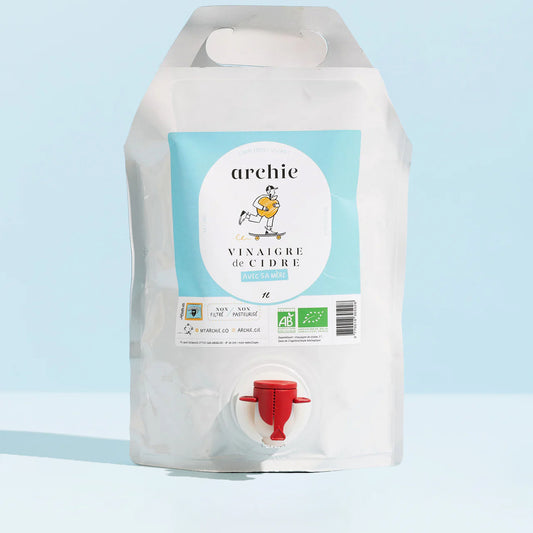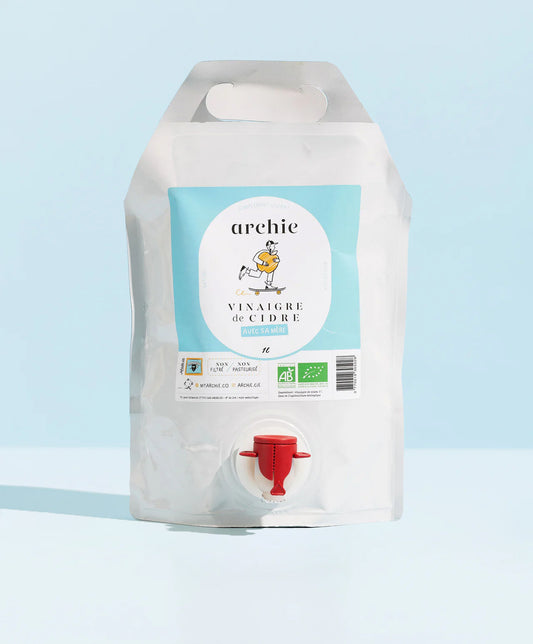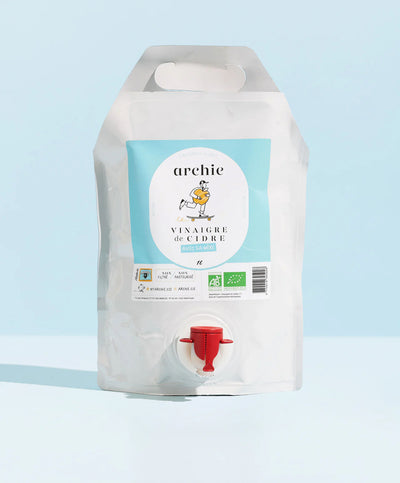Acid reflux, also known as gastroesophageal reflux disease (GERD), can be a source of daily discomfort for many people. In this article, we'll explore the causes of acid reflux, the consequences of stomach acid, and share natural remedies, with a particular focus on the benefits of apple cider vinegar and other alternative solutions. Let's discover together how to naturally relieve these unpleasant symptoms and improve your quality of life.
Understanding acid reflux
Acid reflux, also known as acid reflux or gastroesophageal reflux disease (GERD), is the result of a dysfunction of the lower esophageal sphincter (LES). To understand these unpleasant symptoms, it is essential to look at the underlying causes and mechanisms.
1. Lower Esophageal Sphincter (LES): A Key Role in Reflux Prevention
The LES is a circular muscle located at the junction between the esophagus and the stomach. Its main function is to keep the lower end of the esophagus closed after food has passed into the stomach. When the LES is functioning properly, it prevents acidic stomach contents from flowing back up into the esophagus.
2. LES Dysfunction: Main Cause of Acid Reflux
Acid reflux occurs when the LES does not close properly or opens inappropriately. This can allow stomach acids to back up into the esophagus, causing a characteristic burning sensation. Several factors can contribute to LES dysfunction, including:
- Muscle relaxation : With age, the muscles of the LES can lose their tone, increasing the risk of acid reflux.
- Obesity : Excess weight can put extra pressure on the stomach, promoting acid reflux.
- Pregnancy : Hormonal changes and increased pressure on the abdomen during pregnancy can contribute to a sagging LES.
- Diet : Certain foods, such as spicy, fatty, or acidic foods, as well as excessive caffeine and alcohol consumption, can weaken the LES.
3. Symptoms Associated with Acid Reflux
Besides the burning sensation in the chest, acid reflux can be accompanied by other unpleasant symptoms. These symptoms may include:
- Acid regurgitation : A backflow of gastric contents into the mouth, often associated with an acidic taste.
- Chronic cough : Repeated inhalation of small volumes of reflux can lead to irritation of the respiratory tract, causing a persistent cough.
- Difficulty swallowing : Chronic acid reflux can cause damage to the esophagus, making swallowing uncomfortable.
Reacting to Gastroesophageal Reflux: Practical Advice
When faced with an episode of gastroesophageal reflux disease (GERD), it is essential to adopt responsive strategies to alleviate discomfort and minimize the risk of recurrence. Here are some practical tips for responding effectively to acid reflux:
1. Adopt an Upright Position:
After experiencing reflux symptoms, stay upright as much as possible. Gravity can help prevent reflux by keeping stomach acids in the stomach. Avoid lying down immediately after eating, as this can worsen symptoms.
2. Drink Water:
Drinking water can help dilute stomach acids and return them to the stomach. However, avoid drinking excessive amounts of water at one time, as this can increase stomach pressure and worsen reflux.
3. Chew Sugar-Free Gum:
Chewing sugar-free gum can stimulate saliva production, which can neutralize stomach acids. It can also help relieve the burning sensation in the esophagus.
4. Avoid Constrictive Positions:
Tight clothing around the waist can put pressure on the stomach, promoting reflux. Choose loose, comfortable clothing, especially after meals.
5. Avoid Late Meals:
Avoid eating too late at night, as this can increase the risk of reflux during the night. Try to eat dinner at least two to three hours before bed.
6. Raise the Head of the Bed:
By raising the head of your bed a few inches, you can reduce the risk of reflux during the night. This allows gravity to work in your favor to keep stomach acids in your stomach.
7. Incorporate Soothing Foods:
Certain foods can help soothe the stomach and reduce acidity. Yogurt, honey, banana, and rice are often considered soothing to the digestive system.
8. Consult a Health Professional:
If reflux symptoms are frequent or severe, it is crucial to consult a healthcare professional. A doctor can assess the underlying cause of reflux and recommend specific treatments based on the severity of the condition.
9. Avoid Known Triggers:
Identify foods and drinks that trigger your reflux symptoms and try to avoid them as much as possible. This may include coffee, spicy foods, citrus fruits, fatty foods, and other personal triggers.
By adopting these responsive strategies, you can better manage gastroesophageal reflux episodes and improve your quality of life. However, it is always recommended to consult a healthcare professional for personalized advice and appropriate follow-up. Self-management of reflux should be undertaken responsibly, taking into account individual factors and each person's needs.
Natural Solutions and Recommended Products to Relieve Acid Reflux
For those looking for natural alternatives to traditional medications, several solutions can offer effective relief from acid reflux. Here are some recommended natural remedies and products that have gained popularity for their ability to soothe the symptoms of gastroesophageal reflux:
1. Apple Cider Vinegar:
Apple cider vinegar often tops the list because of its alkaline properties, which can help neutralize stomach acids. Opt for organic, unfiltered, and unpasteurized apple cider vinegar, as it contains beneficial enzymes and probiotics. Dilute one tablespoon in a glass of water and consume before meals to potentially reduce acid reflux.
2. Deglycyrrhizinated Licorice Gum:
Licorice is known for its soothing properties on the digestive system, but the glycyrrhizin in licorice can have side effects. Opt for deglycyrrhizinated licorice (DGL) gum, which retains the benefits of licorice without the risks associated with glycyrrhizin. Chew a DGL gum before meals to promote healthy digestion.
3. Aloe Vera:
Aloe vera gel can provide relief from heartburn and esophageal irritation. Be sure to use a form specifically designed for oral consumption. Drink a small amount of aloe vera gel diluted in water, preferably before meals.
4. Ginger:
Ginger is known for its anti-inflammatory properties and soothing effect on the digestive system. Make a cup of ginger tea by steeping fresh ginger slices in hot water. Drink this tea after meals to help prevent acid reflux.
5. Baking Soda:
Baking soda is a natural antacid that can help neutralize stomach acid. However, it should be used with caution due to its high alkaline properties. Dissolve a small amount of baking soda in a glass of water and drink occasionally to relieve symptoms.
6. Probiotic Supplements:
Probiotics promote a balanced gut flora and can contribute to healthy digestion. Choose quality probiotic supplements or opt for probiotic-rich foods such as natural yogurt, sauerkraut, or kimchi.
7. Peppermint Essential Oil:
Peppermint essential oil can have a soothing effect on the digestive system. Add a few drops of peppermint essential oil to a teaspoon of honey and dilute in hot water for a refreshing after-meal tea.
8. Alkaline Foods:
Include alkaline foods such as bananas, sweet potatoes, green leafy vegetables, and almonds in your diet. These foods can help balance stomach pH and reduce acidity.
9. Wedge Pillows:
For those who suffer from nighttime reflux, using wedge pillows can help elevate the upper body during sleep, reducing the risk of reflux.
Before incorporating these natural solutions, it is recommended to consult a healthcare professional to ensure they are appropriate for your individual situation. While these remedies can offer relief, a holistic approach and a thorough understanding of lifestyle habits are essential to effectively treat acid reflux.
In conclusion, acid reflux, or gastroesophageal reflux, can be managed naturally by understanding the root causes of these unpleasant symptoms. Lower esophageal sphincter (LES) dysfunction plays a key role in acid reflux, and simple lifestyle adjustments, dietary choices, and the integration of natural remedies can significantly help alleviate these symptoms.
The emphasis on apple cider vinegar and other natural remedies offers acid reflux sufferers a variety of options to alleviate the associated discomfort. However, it's important to remember that every individual is unique, and it's recommended to consult a healthcare professional before making any significant changes.
By adopting practical, responsive tips, such as maintaining an upright position after meals and avoiding certain food triggers, as well as incorporating natural solutions such as apple cider vinegar, deglycyrrhizinated licorice gum, aloe vera, ginger, and others, a significant improvement in the quality of life for those suffering from acid reflux can be expected.
*To date, there are no published French scientific studies on the benefits of apple cider vinegar. To address this information gap, Archie has formed a Scientific Committee dedicated to providing the greatest possible transparency regarding the benefits of apple cider vinegar.
























